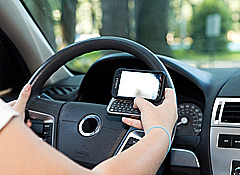Tragedies involving distracted driving are becoming all too familiar. Hearing firsthand about how a careless act can ruin lives can be shocking, but as I was recently reminded, learning what can be done to prevent such accidents can be inspiring.

As part of a Connecticut Safe Kids conference and my own ongoing child-passenger safety training, I recently had the pleasure of hearing a presentation given by Tim Hollister. Tim is an attorney who lives in the Hartford area and who has become a well-known advocate for teen-driver laws and best practices following the loss of his son Reid in a vehicle crash on December 2, 2006. (Tim publishes a safety-related blog called From Reid's Dad.)
This week marks the sixth anniversary of Reid's death. And thanks in part to the work of people like Reid's Dad, the past six years have seen big changes in teen driver laws. Many states now have some level of graduated licensing (GDL) for new drivers. Provisions of such laws address most of the key concerns associated with young drivers, including their lack of experience and good driving judgment, the risks associated with added passengers, their propensity to engage in risky behaviors such as texting or cell phone use, and the added risks of driving at night.
But it wasn't the graduated licensing portion of Mr. Hollister's presentation that I found most valuable, but rather two pieces of practical tips for parents.
Teen safety tips
Air traffic control: If you're the parent of a teen driver, treat your child's trips somewhat like an air traffic controller. Much like a pilot would have to file a flight plan and consider key items before "taking off," your driving teen should do the same.
Items to include in their "flight plan":
Destination
Route
Time of day they are traveling
When they are expected to depart and arrive
What car they are driving
Their plan for contacting someone
What is their contingency plan should something go wrong
Confirm they feel rested and alert (fatigue can be of particular concern for teenagers)
If they can't give you a clear answer on these items then perhaps it's not a trip they should be taking. And of course, should any of the answers change during their trip, they must contact you as the controller to revise the flight plan.
No cruising: The act of "just driving around" can be dangerous and risky. When teens are expected at a particular destination and at a certain time such as a date or a party they have much more incentive to drive in a way that gets them there safely. Purposeful driving is more likely to result in a safe outcome for all than joyriding. It was this that struck a personal note with me as I recalled my own "small town" teen nights of "just driving around" and the risks we took. If your teen's flight plan includes the answer "just driving around," perhaps they need a new plan or need to turn over the keys.
Next fall, Chicago Review Press will publish a book based on Mr. Hollister's experiences titled "Not So Fast: Parenting Teen Drivers Before They Get Behind the Wheel."





